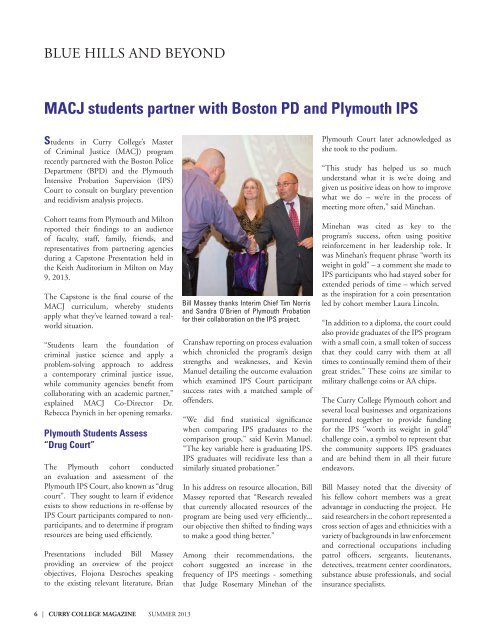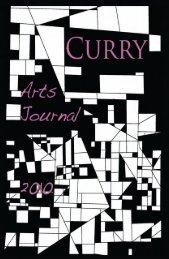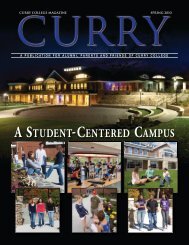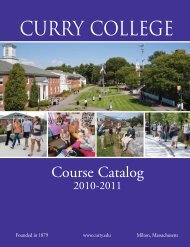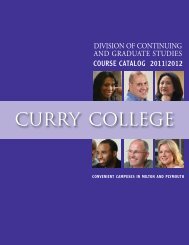You also want an ePaper? Increase the reach of your titles
YUMPU automatically turns print PDFs into web optimized ePapers that Google loves.
BLUE HILLS AND BEYONDMACJ students partner with Boston PD and Plymouth IPSStudents in <strong>Curry</strong> <strong>College</strong>’s Masterof Criminal Justice (MACJ) programrecently partnered with the Boston PoliceDepartment (BPD) and the PlymouthIntensive Probation Supervision (IPS)Court to consult on burglary preventionand recidivism analysis projects.Cohort teams from Plymouth and Miltonreported their findings to an audienceof faculty, staff, family, friends, andrepresentatives from partnering agenciesduring a Capstone Presentation held inthe Keith Auditorium in Milton on May9, 2013.The Capstone is the final course of theMACJ curriculum, whereby studentsapply what they’ve learned toward a realworldsituation.“Students learn the foundation ofcriminal justice science and apply aproblem-solving approach to addressa contemporary criminal justice issue,while community agencies benefit fromcollaborating with an academic partner,”explained MACJ Co-Director Dr.Rebecca Paynich in her opening remarks.Plymouth Students Assess“Drug Court”The Plymouth cohort conductedan evaluation and assessment of thePlymouth IPS Court, also known as “drugcourt”. They sought to learn if evidenceexists to show reductions in re-offense byIPS Court participants compared to nonparticipants,and to determine if programresources are being used efficiently.Presentations included Bill Masseyproviding an overview of the projectobjectives, Flojona Desroches speakingto the existing relevant literature, BrianBill Massey thanks Interim Chief Tim Norrisand Sandra O’Brien of Plymouth Probationfor their collaboration on the IPS project.Cranshaw reporting on process evaluationwhich chronicled the program’s designstrengths and weaknesses, and KevinManuel detailing the outcome evaluationwhich examined IPS Court participantsuccess rates with a matched sample ofoffenders.“We did find statistical significancewhen comparing IPS graduates to thecomparison group,” said Kevin Manuel.“The key variable here is graduating IPS.IPS graduates will recidivate less than asimilarly situated probationer.”In his address on resource allocation, BillMassey reported that “Research revealedthat currently allocated resources of theprogram are being used very efficiently...our objective then shifted to finding waysto make a good thing better.”Among their recommendations, thecohort suggested an increase in thefrequency of IPS meetings - somethingthat Judge Rosemary Minehan of thePlymouth Court later acknowledged asshe took to the podium.“This study has helped us so muchunderstand what it is we’re doing andgiven us positive ideas on how to improvewhat we do – we’re in the process ofmeeting more often,” said Minehan.Minehan was cited as key to theprogram’s success, often using positivereinforcement in her leadership role. Itwas Minehan’s frequent phrase “worth itsweight in gold” – a comment she made toIPS participants who had stayed sober forextended periods of time – which servedas the inspiration for a coin presentationled by cohort member Laura Lincoln.“In addition to a diploma, the court couldalso provide graduates of the IPS programwith a small coin, a small token of successthat they could carry with them at alltimes to continually remind them of theirgreat strides.” These coins are similar tomilitary challenge coins or AA chips.The <strong>Curry</strong> <strong>College</strong> Plymouth cohort andseveral local businesses and organizationspartnered together to provide fundingfor the IPS ‘’worth its weight in gold’’challenge coin, a symbol to represent thatthe community supports IPS graduatesand are behind them in all their futureendeavors.Bill Massey noted that the diversity ofhis fellow cohort members was a greatadvantage in conducting the project. Hesaid researchers in the cohort represented across section of ages and ethnicities with avariety of backgrounds in law enforcementand correctional occupations includingpatrol officers, sergeants, lieutenants,detectives, treatment center coordinators,substance abuse professionals, and socialinsurance specialists.6 | CURRY COLLEGE MAGAZINE SUMMER 2013


